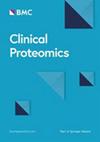基于中国肺腺癌蛋白质组图谱的预后生物标志物发现
IF 3.3
3区 医学
Q2 BIOCHEMICAL RESEARCH METHODS
引用次数: 0
摘要
尽管最近在成像和基因组筛查方面的创新促进了肺腺癌(LUAD)诊断和治疗的进步,但肺腺癌的死亡率仍然很高,而且人们对肺腺癌的生物学特性了解不足。我们之前的研究对 LUAD 进行了多组学综合分析,填补了基因组改变及其生物蛋白组效应之间的空白。然而,蛋白质组水平上更详细的分子表征和生物标志物资源仍有待发掘。在本研究中,我们对来自患者的良性肺病样本进行了定量蛋白质组实验。之后,我们将蛋白质组数据与之前的 103 个配对 LUAD 样本数据集进行了整合。我们描绘了非癌样本和肿瘤样本之间以及不同病理亚型之间的蛋白质组差异。我们还发现,有丝分裂上调是早期 LUAD 的一个重要特征。此外,我们的综合分析筛选出了 75 个潜在的预后生物标志物,并在一个独立的 LUAD 血清队列中验证了其中的两个。这项研究为进一步了解 LUAD 蛋白质组异常提供了见解,而新的预后生物标志物的发现则为 LUAD 的精确管理提供了机会。本文章由计算机程序翻译,如有差异,请以英文原文为准。
Prognostic biomarker discovery based on proteome landscape of Chinese lung adenocarcinoma
Despite recent innovations in imaging and genomic screening promotes advance in diagnosis and treatment of lung adenocarcinoma (LUAD), there remains high mortality of LUAD and insufficient understanding of LUAD biology. Our previous study performed an integrative multi-omic analysis of LUAD, filling the gap between genomic alterations and their biological proteome effects. However, more detailed molecular characterization and biomarker resources at proteome level still need to be uncovered. In this study, a quantitative proteomic experiment of patient-derived benign lung disease samples was carried out. After that, we integrated the proteomic data with previous dataset of 103 paired LUAD samples. We depicted the proteomic differences between non-cancerous and tumor samples and among diverse pathological subtypes. We also found that up-regulated mitophagy was a significant characteristic of early-stage LUAD. Additionally, our integrative analysis filtered out 75 potential prognostic biomarkers and validated two of them in an independent LUAD serum cohort. This study provided insights for improved understanding proteome abnormalities of LUAD and the novel prognostic biomarker discovery offered an opportunity for LUAD precise management.
求助全文
通过发布文献求助,成功后即可免费获取论文全文。
去求助
来源期刊

Clinical proteomics
BIOCHEMICAL RESEARCH METHODS-
CiteScore
5.80
自引率
2.60%
发文量
37
审稿时长
17 weeks
期刊介绍:
Clinical Proteomics encompasses all aspects of translational proteomics. Special emphasis will be placed on the application of proteomic technology to all aspects of clinical research and molecular medicine. The journal is committed to rapid scientific review and timely publication of submitted manuscripts.
 求助内容:
求助内容: 应助结果提醒方式:
应助结果提醒方式:


